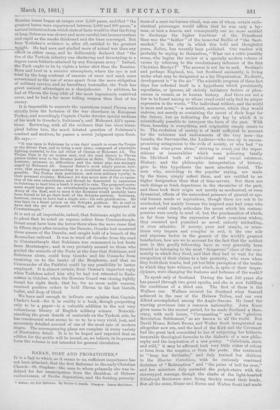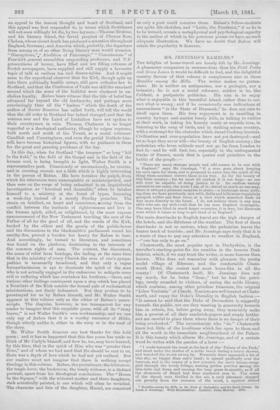RABAN, POET AND PROBATIONER.* IT is a fact to which,
as it seems to us, sufficient importance has not been attached, that the first Reformer in the early Christian Church—St. Stephen—the man to whom primarily she was in- debted for her emancipation from the thraldom of Hebrew exclusiveness, of Scribe dogmatism, and the fretting prescrip- __
* Rabat, ; or, Life Sptiatere. By Walter C. Smith, Glasgow : James Maulebose. tions of a semi-barbarous ritual, was one of whom certain eccle- siastical personages would affirm that he was only a lay- man, at best a deacon, and consequently one no more entitled to discharge the higher functions of the Priesthood than was the &Wier " of the immortal Bairns of " the Sant- market," in the city in 'which this bold and thoughtful poem, _Haan, has recently been published. Our readers will probably be saying to themselves, " What can a critic possibly mean, who begins the review of a specially modern volume of verses by referring to the revolutionary influence of the first Christian Martyr P" The answer is not far to seek. Scotland, and perhaps England, too, but Scotland eminently, is living under what may be designated as a lay Dispensation. No doubt,. development is " in the air." The scientific progress of these last days has reflected itself in a hypothesis which persistently repudiates, or ignores, all strictly initiatory factors or phen- omena in cosmic, as in human history. And there are not a few to be found among us whose creed could only find its proper expression in the words, " The individual withers, and the world is more and more,"—a sentiment, moreover, which they would endorse, not merely as containing the secret of their hope for
future, but as indicating the only key by which it is scientifically possible to interpret the facts of the past. With them, heredity is everything, and originality simply ceases to be. The evolution of society is of itself sufficient to account for the existence and endowments of the very men—the Isaiahs, the Savonarolas, the Luthers—who rose up in uncom- promising antagonism to the evils of society, or who had "to tread. the wine-press alone," striving to crush out the super- stitions or immoralities which were poisoning fatally the life-blood both of individual and social existence.. History, and the philosophic interpretation of history, give to this hypothesis the most absolute denial. The men who, according to the popular saying, are made by the times, simply reflect them, and are entitled to no higher designation than that of time-servers. But there are such things as fresh departures in the chronicles of the past,. and these took their origin not merely as mechanical, or even dynamical, effects of the antecedent pressure of general or spe- cial human needs or aspirations, though these are not to be overlooked, but mainly because the inspired man had come who saw and could clearly articulate the secret which his contem- poraries were sorely in need of, but the proclamation of which, so far from being the expression of their conscious wishes, they resented and punished as novel, entirely misleading, or even atheistic. If society, pure and simple, or some- times very impure and complex in evil, is the one sole and supreme factor in the genesis of the world's greatest benefactors, how are we to account for the fact that the noblest• men iu this goodly fellowship have so very generally been treated as belonging to the most " dangerous " class of the com- munity in which they lived, and that they had to wait for the recognition of their claims to a late posterity, who even when they built their tombs, had yet but little perception of the truths: to which they bore witness, and which, in spite of their imper- cipience, were changing the features and fortunes of the world ?
To speak only of Scotland. During the last 500 years she has passed through two great epochs, and she is now fulfilling the conditions of a third one. The first of these is the Wallace one. Wallace secured for Scotland what Samuel achieved in the case of the Hebrew Tribes, and our own Alfred accomplished among the Anglo-Saxous. He fused the warring provinces into a common nationality. John Knox gives name to the second period, for he made Scotland a theo- cracy, with such issues, " Covenanting " and tho " glorious Revolution Settlement," as are known to all the world. But David Hume, Robert Burns, and Walter Scott inaugurated an altogether new era, and the laud of the Kirk and the Covenant had the great task committed to her of subjecting her hitherto, inexorable theological formulae to the dialectic of a new philo- sophy and the inspiration of a new poetry. " Caledonia, stern. and wild," it may be affirmed, took very little either of colour• or form from the sceptics, or from the poets. She continued. to " keep her Sabbaths," and duly trained her children in the Shorter Catechism, with its curiously combined. doctrines of " Redemption " and " the pains of hell for ever," and her ministers duly ascended the pulpit-stairs with the stereotyped message, though the shafts of the light-hearted: Edinburgh Reviewers were flying thickly round their heads.. But all the same, Hume and Burns and Walter Scott had made. an appeal to the inmost thought and heart of Scotland, and this appeal was first responded to, in terms which Scotchmen will not soon willingly let die, by two laymen,—Thomas Erskine, and his literary friend, the fervid prophet of Cheyne Row, Chelsea, whose recent death has produced a sensation throughout England, Germany, and America which, probably, the departure from among us of no other living literary man would occasion. "Disruptions,"." Abolition of Patronage," " Commissions" of Free-kirk general assemblies suspending professors, and U.P. prosecutions of heresy, have filled and are filling columns of Scotch newspapers, have supplied and still supply a favourite topic of talk at endless tea and dinner-tables. And it might seem to the superficial observer that the Kirk, though split up into three politically hostile camps, still gave orthodox law to Scotland, and that the Confession of Faith was still the standard around which the arms of the faithful were clustered iu un- shaken loyalty. Raban bears witness that the tide of belief has advanced far beyond the old landmarks, and perhaps more convincingly than all the " leaders " which the death of the author of Sartor Resartus has called forth, will tell the world that the old order in Scotland has indeed changed, and that the veteran seer and the Laird of Linlathen have not spoken to -their countrymen in vain. Thomas Chalmers is no longer regarded as a theological authority, though he reigns' supreme, both north and south of the Tweed, as a social reformer. Candlish and Cunningham, and even the genial Guthrie him- 'self, have become historical figures, with no guidance in them for the great and pressing problems of the day.
In this day, when for Scotland "the treasure" so long "hid an the field," in the field of the Gospel and in the field of the human soul, is being brought to light, Walter Smith is a representative poet. Consciously or unconsciously, he creates, and in creating reveals not a little which is highly interesting in the person of Raban. His hero forsakes the pulpit, from
• which his utterances were unacceptable or misinterpreted, and then were on the verge of being submitted to an inquisitorial investigation as "heretical and damnable," when he betakes himself to a ministry at the fount of types, becoming a week-day instead of a merely Sunday preacher. The strain on intellect, on heart and conscience, arising from the conflict between the instincts of righteousness and love iu the human spirit, aided, as enlightened, by the most express announcement of the New Testament touching the care of the Father of all for the good of all, and the creeds of the Kirk, backed by the elders and the gossip of the public-house and the discussions in the blacksmith's parliament round his smithy-fire, proved a burden too heavy for Raban to bear. And accordingly, ho turned to literature, and sometimes was found on the platform, declaiming in the interests of the common rights of man. The content, the discontent, the sense of relief from bondage, the feeling at the same time that in the ministry of every Church the area of one's sympa- pathies is necessarily broadened, and that only a vague humanitarianism is apt to dominate the spirit of the man who is not actually engaged in the endeavour to mitigate some civil or suffering which has overtaken his brethren,—these, and various other feelings consiequent upon a step which has placed a licentiate of the Kirk outside the formal pale of ecclesiastical aninistrations, are finely delineated. But they profess to be pourtrayed for us by Raban himself, and Mr. Walter Smith .appears in this volume only as the editor of Raban's manu- scripts. The disguise, however, is too • transparent for any reader to imagine that this exquisite poem, with all its "stray leaves," is not Walter Smith's own workmanship, and we can only say of Raban that it is a worthy successor of Hilda, though utterly unlike it, either in the warp or in the woof of the story.
Mr. Walter Smith deserves our best thanks for this bold poem ; and it has so happened that this fine poem has made us 'think of Mr. Carlyle himself, and how he, too, may have learned, by this time, that in the spirit of Him who was "greater than Zeno," and of whom we had need that He should be sent to us, there was a depth of love which he had not yet realised. But Cur readers must not imagine that there is nothing except theology in this volume. Raban, the probationer, the litteratenr, 'the tragic lover, the bookworm, the lonely widower, is a distinct portrait, apart from his theological conclusions. The " House in the Square," with the widowed mother and three daughters, (filch artistically painted, is one which will often be revisited. The character and fate of the daughter, Muriel, are conceived as only a poet could conceive them. Raba,n's• fellow-students are quite life-sketches, and " Latto, the Pantheist," if so he is to be termed, reveals a metaphysical and psychological capacity in the author of which in his previous poems we have uo such adequate illustration. We have no doubt that Raban will attain the popularity it deserves.



































 Previous page
Previous page